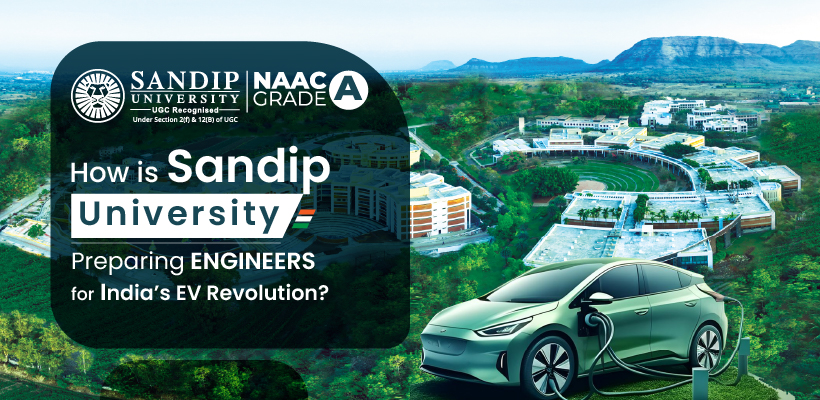Sandip University is one of the top engineering colleges in Nashik offering programs that train electric vehicle (EV) engineers. Sandip University’s M.Tech Electric Vehicles program is designed to prepare engineers for India’s EV revolution through a cutting-edge curriculum, dynamic skill building opportunities, industry exposure, and overall student development. The electric vehicle industry is a revolutionary aspect of the automobile industry that is quickly gaining momentum.
India’s EV revolution is just starting out. A high demand for skilled professionals is found in the industry at present. Since it is a new field, there are ample career opportunities in this field for skilled and trained professionals. The Make in India campaign is creating a market for home-grown brands that design and manufacture EVs in India. This is the right time to pursue a futuristic engineering degree program in electronics vehicles for a future-proof career.
Let us take a look at how Sandip University’s EV engineering programs prepare engineers for a future in the industry, and career opportunities upon graduation:
How do Sandip University’s EV Engineering Programs Prepare Engineers?
Sandip University’s M.Tech Electric Vehicle Engineering course is a class apart from other programs due to:
- Specialised Education and Knowledge Building
The program is designed in close collaboration with industry leaders and experts. Various industry-linked value addition and global certification programs are included in the curriculum to provide relevant industry-based skill building opportunities for students. There is ample scope for knowledge-building through classroom sessions, guest lectures, and seminars.
- Focus on Technical and Specialised Skills
Students at Sandip University are trained in high-tech labs and training facilities on-campus. Various Centres of Excellence have been developed in collaboration with global EV industry partners to train students in the EV section of the automobile industry. Students are trained through various technical skill building activities to make them employable professionals upon graduation.
- Ensuring Software Proficiency
The EV industry has various software integrated in its automobile systems that need added proficiency. Sandip University’s EV programs focus on training students in relevant software like MATLAB, AUTOSAR, AutoCAD, and CAD/CAM tools. These software and tools help students understand the EV industry in-depth and become proficient in EV applications.
- Practical Experience with Hands-on Assignments
Sandip University’s Electric Vehicle Engineering courses focus on student development through practical experience and hands-on assignments. Students are expected to participate in group and individual projects, assignments, hands-on skill building activities, presentations etc. to gain a practical understanding of the EV industry at the academic level.
- Relevant Industry Engagement
Sandip University has partnered with top industry experts in the automobile sector to provide students with industry engagement and exposure. Students are trained through industry visits and compulsory internships. Additionally, various workshops, webinars, inter-college competitions, student exchange programs, etc. are organised to provide industry exposure to students.
- Expertise in Manufacturing and EV Infrastructure
The EV industry is manufacturing-heavy so it is important for students to have a deep understanding of the EV manufacturing process and its infrastructure. Students are trained to understand the manufacturing process of components, battery, body, etc., develop skills in supply chain management, and understand the EV infrastructure like battery charging stations, storage systems, etc.
- Focus on Research and Development
The EV industry is very ripe for futuristic research and development. Sandip University’s EV programs are research-intensive, with ample scope for research opportunities. Students can conduct joint research programs with faculty and industry partners. They can also access research opportunities with international academic partners for a global research and development approach to the EV sector.
Top Career Opportunities in the EV Industry
The EV industry has various career opportunities open to professionals who hold qualifications and training from a leading institution like Sandip University. Here are the top career options that graduates can opt for in the EV sector:
- Battery Engineers
Battery engineers are professionals who design, develop, test, manufacture, and maintain advanced battery systems that can be installed in EVs. They have to develop batteries that are high-performing and durable.
- EV Design Engineers
EV design engineers are tasked with designing and developing electric vehicles like cars, buses, scooters, etc. They have to design futuristic and sturdy features and components of such electric vehicles.
- Manufacturing Engineers
Manufacturing engineers in the EV industry oversee the manufacturing and production of EVs. They are responsible for the timely and secure production of EVs and components that are efficient and high in quality.
- Electric Powertrain Engineers
Electric powertrain engineers are responsible for designing, developing, testing, and manufacturing high-performance and high-quality electric motors and powertrains. These professionals are key in positively driving the EV sector.
- Charging Infrastructure Specialists
Charging infrastructure specialists are tasked with planning, installing, and maintaining charging stations. They have to ensure that the power grid is capable of managing the charging station without any lag or failure.
- EV Software Development Engineers
Software development engineers in the EV industry have to design and develop software that can be integrated into EVs. These complicated software systems are responsible for controlling EV functions and user interface.
- Battery Management System Engineers
Battery management system engineers design and develop long-lasting and durable batteries that drive EVs. They develop technologies that directly impact battery performance, endurance, and safety.
Conclusion
These are some of the ways in which Sandip University prepares engineers for India’s EV revolution. As one of the leading engineering colleges in Maharashtra, Sandip University’s degrees are globally-recognised and can lead to excellent placement opportunities upon graduation. Visit www.sandipuniversity.edu.in for more information on EV programs at Sandip University. Good luck!

